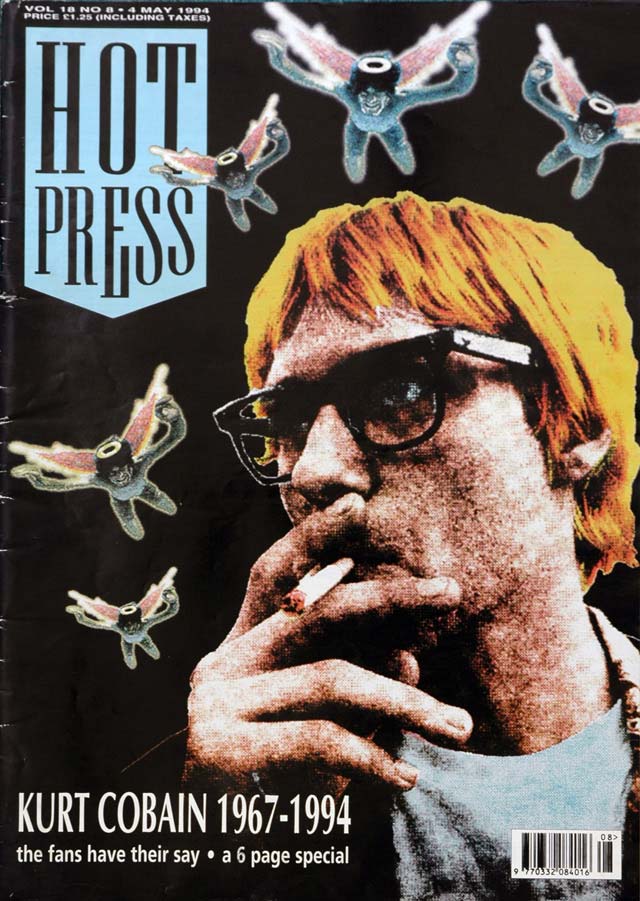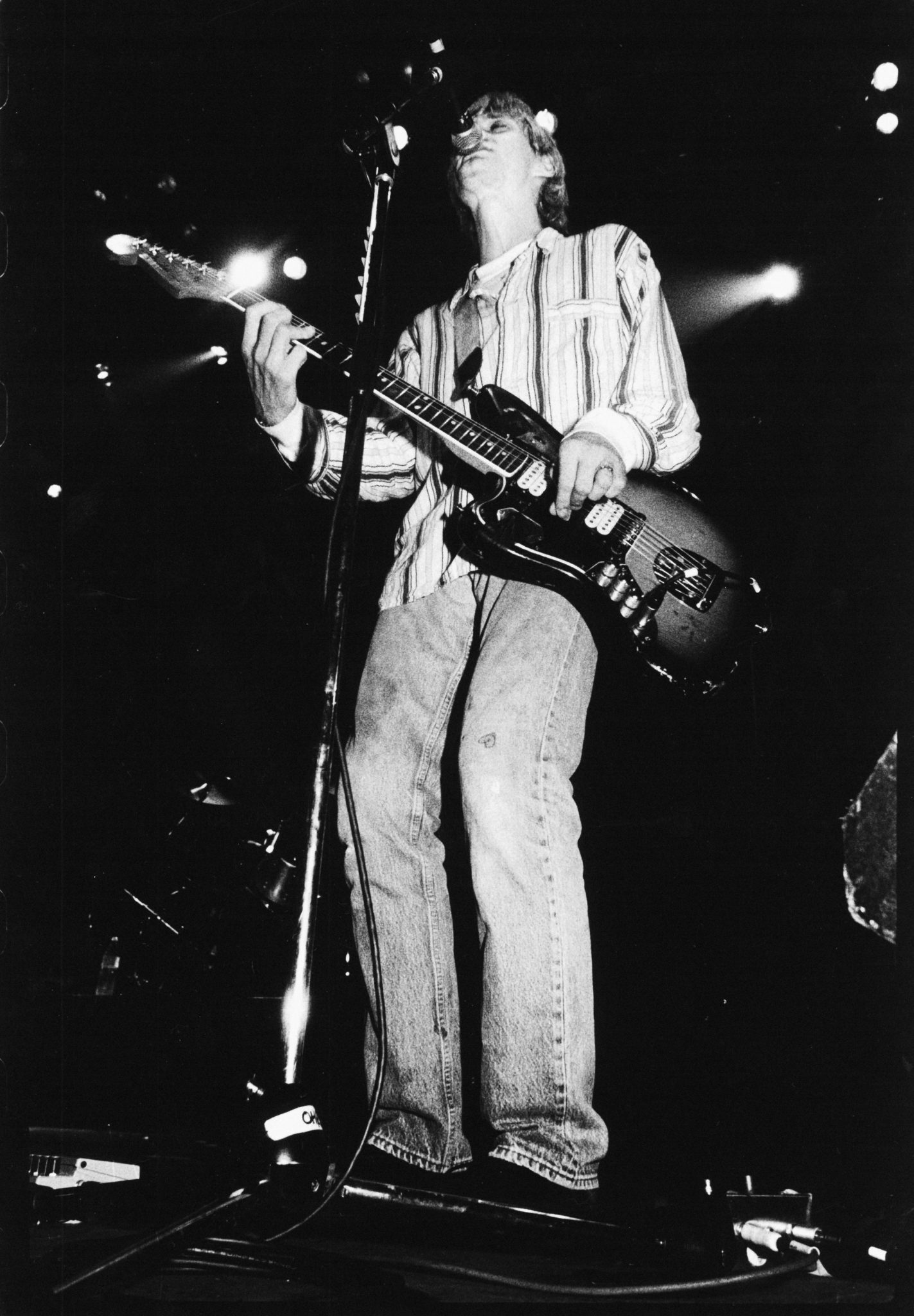- Music
- 05 Apr 24
Remembering Kurt Cobain on his 30th anniversary: Reflections from the Hot Press archives – featuring Dave Grohl, Mark Lanegan and more

In extracts taken from interviews in the Hot Press archives, Dave Grohl, Duff McKagan, St Vincent, Martin Hayes, Bobby Gillespie, Bressie, Mark Lanegan and Butch Vig share their reflections on the life, death and legacy of Kurt Cobain, on the 30th anniversary of his tragic death
Dave Grohl
(2017)
“The Nirvana experience was such a whirlwind. It all happened so quickly – exploded without any warning. And then it just disappeared. Life had changed so much it was almost like you had to find something to hold onto so that you didn’t get swept away. Once it was over, I couldn’t imagine stepping on stage or sitting down at a drum stool and playing music any more. It would just bring me back to the heartbreaking place of losing Kurt...
“You have to understand, for me, Nirvana is more than it is for you. It was a really personal experience. I was a kid. Our lives were lifted and then turned upside down. And then our hearts were broken when Kurt died. The whole thing is much more personal than the logo or the t-shirt or the iconic image.”
Duff McKagan
The Guns N' Roses bassist recalls sitting beside Kurt on his flight back to Seattle, after leaving the Exodus rehab centre in Los Angeles. Just a few days later, Kurt was dead.
(2008)
“I suppose, at the time, we were in the same boat in a lot of ways. We were both in huge groups, and we were both completely lost to our addictions. He did seem down, and he was definitely at a crossroads, although I’m not sure he would have confided in me just how bad he felt. Still, when we got off the plane, I did say to my friend who picked me up that maybe we should invite Kurt back to the house. He went to talk to him, but he’d already left.”
Niall "Bressie" Breslin
On the inspiration behind The Blizzards' track 'Something Grips You, Something Holds You'
(2022)
“That song is as personal as it gets for me. It’s about the day Kurt Cobain died – and the Christian Brother punching the desk, calling him a coward, and screaming in my face. I just remember going, ‘This is my hero. How are you talking about him like this?’ I didn’t even know what had happened. I was 14 years of age and I was in the midst of my own shit. That whole song is what I should have heard that day – what I needed to hear, as somebody who was upset and confused.”
Bobby Gillespie
(2000)
"When Kurt Cobain died it upset me because I thought he was a young man with a lot to say. He seemed like a good fella and he definitely had his heart in the right place. We need people like him."
(the Primal Scream singer/songwriter again, in 2021)
“Kurt Cobain had a working class anger. He had an anger that bands like Pavement don’t. Among a lot of those American alternative bands, he was maybe alone in being a working class guy. That rage, you can also hear it in Iggy Pop and The Stooges – they were working class, same with The MC5. The same with The Sex Pistols; to me that’s punk rock.
“Punk rock’s a working class thing, just like the blues and country are. That sense of struggle and embittered poetry can only come from people who are under-privileged, or who’ve been oppressed in some way. Anything else can be great, it can be art-rock, it can be beautiful and we can love it, but I don’t think it’s going to have the same grit and fucking determination.”

St Vincent
On fronting a reunited Nirvana at the 2014 Rock & Roll Hall of Fame induction ceremony – and how having Joan Jett, Lorde and Kim Gordon also do so paid tribute to both the subversive spirit of the band, and Kurt Cobain’s anti-macho stance.
(2017)
"You can see Kurt’s manifesto or treatise; if you’re a sexist, racist homophobe, don’t buy our records...
"I would also just say that along with the incredible honour it was to be asked, it’s also so deeply sad. Because everybody, myself included, just wishes that Kurt was there doing that. So it’s hard to be gleeful exactly.”
Martin Hayes
On Kurt's death in Seattle – where the iconic Irish fiddle player also lived at the time.
(1995)
"I don't want to sound like I was jumping on the bandwagon afterwards, but I suddenly realised the significance of it all. Actually, everything that he represented was manifested in his death – the actual doom, the depression, the anxiety. I hate to say that it was like a final act that summed up the whole career, but in a way, he spoke and still speaks for a generation in which there's a lot of confusion and disillusionment.
"It's hard to see how grunge came about in Seattle because it has such a lovely sheen of happiness. That's the funny thing about grunge because where everything seems alright, it's not. And they see a hopelessness which they're giving voice to."
Mark Lanegan
(2002)
“Kurt and I both had a love for the kind of spookier blues stuff. I can’t say what he’d be doin’ now but I know that he loved that stuff and it somehow informed what he did. Some of the stuff on The Winding Sheet I sort of wrote with him, we were just in the same room as each other really, and all that stuff came out in various forms, although I never credited him! Really we were just pals, we showed shit to each other.”
Butch Vig
On producing 1991's Nevermind with Nirvana.
(2002)
"[Kurt] could be so charming and so articulate, and then he would just change and totally go into his own shell and not say anything, and so you think, ‘He’s pissed at me or upset about something’. But it had to be always something internal he was dealing with, because it wasn’t like we had an argument. His chemistry would change. It was difficult to deal with him, I had to be able to catch him at periods he was ‘on’ in order to motivate him, to get him to redo a vocal take or check the tuning on his guitar, just so he felt motivated and part of what we were doing. I think with him the extremes just dictated his life.”

Nirvana at The Point, Dublin. By Cathal Dawson.
RELATED

- Music
- 01 Nov 25
On this day in 1994: Nirvana released MTV Unplugged in New York

- Music
- 13 Sep 25
On this day in 1994: Sinéad O'Connor released Universal Mother

- Music
- 26 Apr 25
On this day in 1994: Johnny Cash released American Recordings
RELATED

- Music
- 22 Nov 24
30 years ago today: Pearl Jam released Vitalogy

- Music
- 01 Nov 24
30 years ago today: Nirvana released MTV Unplugged in New York

- Music
- 25 Oct 24




